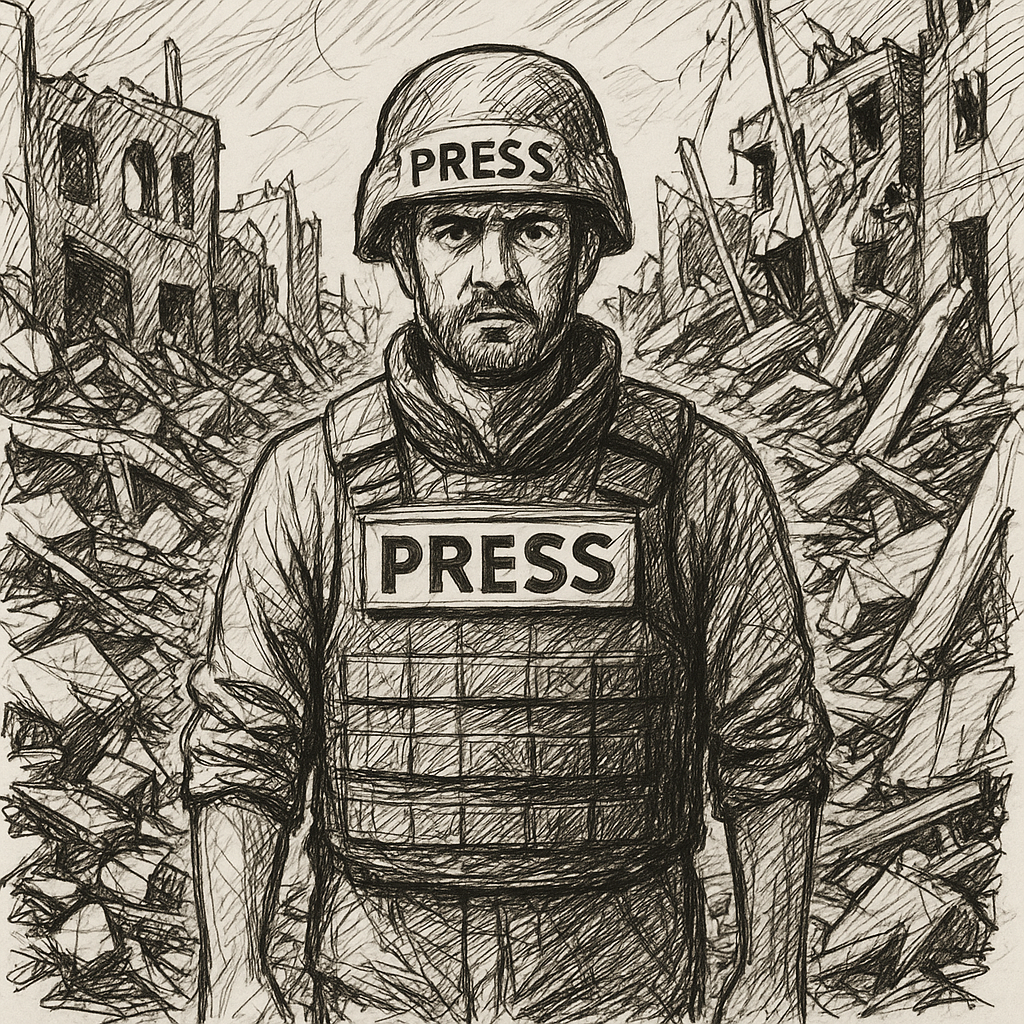
There is no greater danger to a lie than the truth spoken plainly. And in Gaza, the truth was spoken in the voices of men and women who understood the cost of standing in its light.
To bear witness is to bear the price.
On 10 August 2025, outside al-Shifa Hospital, a missile found its way to a journalists’ tent. In an instant, Anas al-Sharif, along with Mohammed Qreiqeh, Ibrahim Zaher, Mohammed Noufal, and Moamen Aliwa, was gone. Their vests read PRESS—not as decoration, not as a plea—but as a contract with the world: We will see for you. We will tell you.
Israel said Anas was a Hamas operative. No evidence was shown. And so the accusation hung in the air like smoke, thick enough to obscure the truth, thin enough to vanish in time.
Al Jazeera called it a “premeditated assassination.”
The Committee to Protect Journalists warned that this was not an isolated wound but part of a pattern. Israel branding the reporter a militant, never proving the claim, and leaving the rest of us to choose between skepticism and complicity.
When a state turns its guns upon the tellers of truth, when it seeks not merely to silence but to erase them, it is not only a crime against the living, it is an assault upon the very covenant of our shared humanity, and under the laws we claim to honor.
Amnesty International is under no illusion, "The deliberate targeting and killing of journalists by Israeli forces constitutes war crimes under international humanitarian law."
This pattern runs like a dark thread through Gaza’s press corps.
- Samer Abu Daqqa, killed in 2023 when an Israeli drone struck a school compound in Khan Younis.
- Hamza Wael al-Dahdouh and Mustafa Thuraya, killed together in 2024 when their car was hit leaving an assignment—an Israeli claim of “terrorist presence” later quietly withdrawn.
- Mohammed Abu Hatab, dead in his own home less than an hour after a live report, his family buried beside him.
- Bilal Jadallah, the mentor and protector of Gaza’s journalists, struck down in his car.
- Yazan Emad al-Zwaidi, gone in the line of duty at Beit Hanoun.
- Hossam Shabat, killed in a strike described by Reporters Without Borders as “targeted.” He was 23.
These were not anonymous casualties. They were named, known, loved. They were men who carried cameras instead of rifles, women who built archives instead of bunkers. They documented the air growing heavy before the bombs fell, the dust settling after. They kept the receipts of history so the guilty could not plead amnesia.
Deliberate targeting
And yet, to kill a journalist in Gaza has become a matter not of chance but of choice. To mark them as combatants is to try to erase the difference between a weapon and a witness.
In his grief, Wael Dahdouh, who has buried both his son Hamza and his colleague Samer, told ABC News, “Hamzah was all mine, he was my breath, and he was my soul, but certainly this loss and this pain will not stop us from continuing on this path .” That is the defiance of the witness: to continue speaking even as the cost grows unbearable.
But here is the truth we must hold: the silencing of journalists is not simply an attack on individuals; it is the narrowing of the world itself. Without their voices, the rubble speaks only in rumors. Without their lenses, the dead are faceless, the living unseen.
The question is not whether Israel has the right to protect itself. The question is whether it has the right to dismantle the eyes that see, the ears that hear, and the mouths that tell the rest of us what is being done in our name.
The press in Gaza does not need our pity, it needs our protection. For when the witness becomes the target, truth itself is under fire. And once truth is gone, the rest will fall silently.
Our sources are your sources. (Except the confidential ones.) Reuters, ABC, The Guardian, IFJ, Al Jazeera, CPJ, Al Jazeera, Watson Institure Report, Amnesty International, Columbia Jounalism Review.